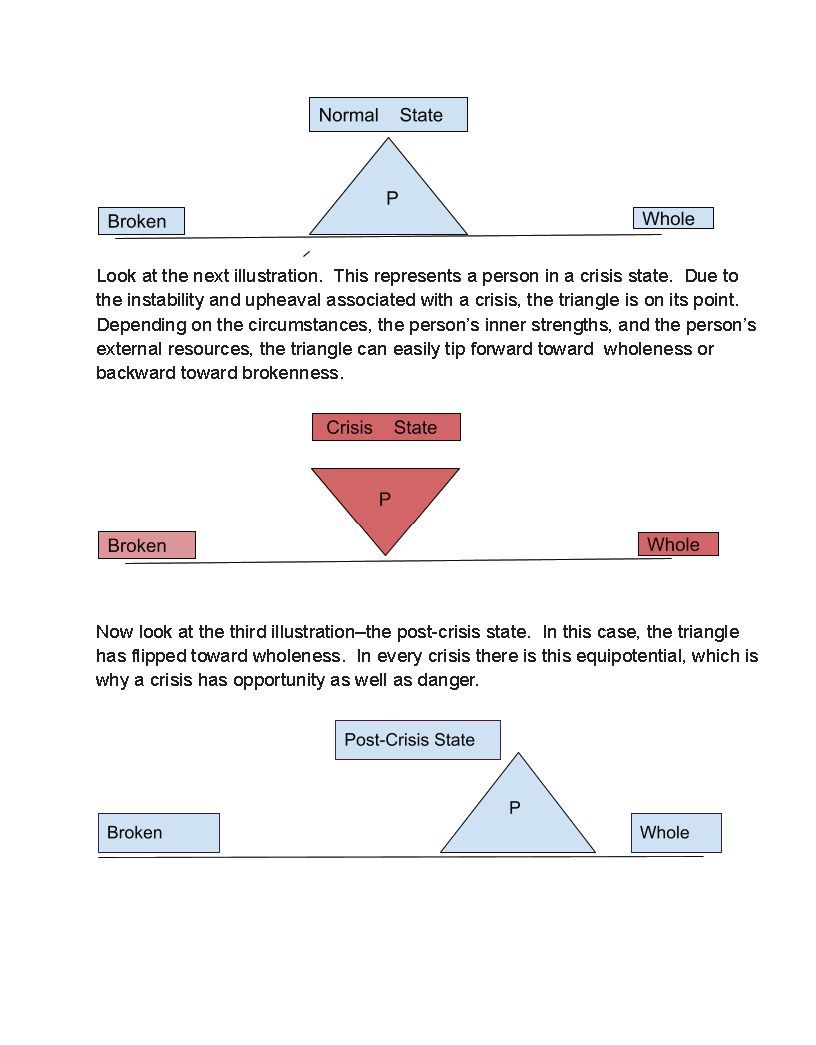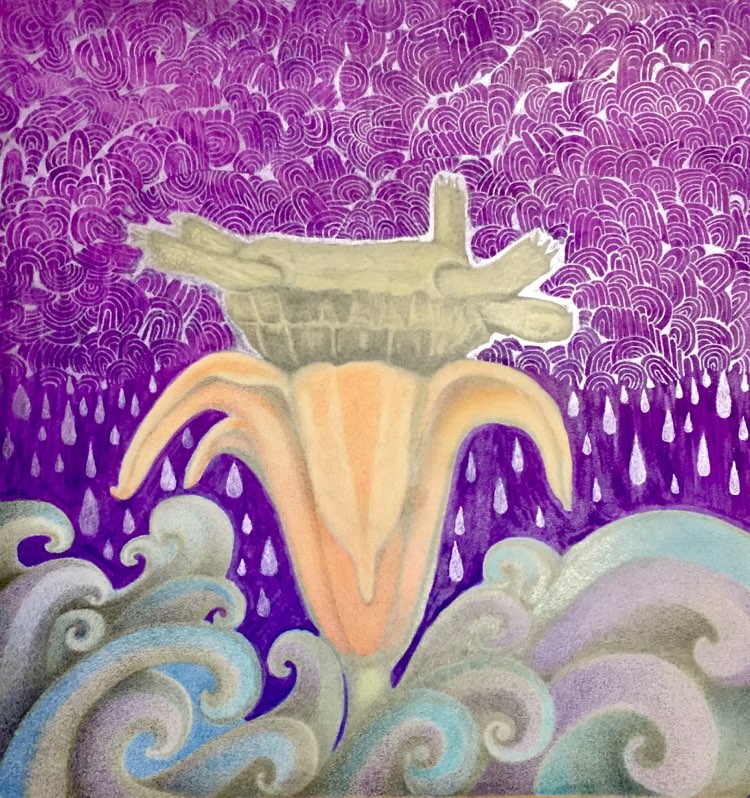(Artwork the courtesy of Karla Jean Gallagher. See more at www.missprintsandmasterpieces.com,)
Have you ever had a moment when nothing made sense? That the rug had been pulled out from under you and you fell flat on your back. Everything around you felt upside down, sideways and backward? Have you ever had a time when you completely lost your way and life had no meaning? A time, or even a length of time when you questioned everything you believed to be true?
If your answer to these questions is “yes,” welcome to the human race! Most likely at these moments, you were in a crisis due to some unexpected catastrophic event, or a culmination of disappointments and setbacks, or perhaps, you were facing some painful, long avoided or buried inner truth?
What Is a Crisis?
The Oxford dictionary defines a crisis as “a time of great danger, difficulty or doubt when problems must be solved or important decisions must be made.” A crisis state is characterized by instability, upheaval and . . . opportunity. Yes, an opportunity is often the overlooked aspect of a crisis.
Look at the three illustrations below. Notice the first is a normal state when a person is usually somewhere between broken and whole, but hopefully closer to being whole. The base of the triangle (think of it as a concrete pyramid) sits on the surface which is its most stable position. To move the triangle to the left or right takes considerable energy.
 Eckhart Tolle in the introduction to his book The Power of Now describes going through this exact process. He writes,
Eckhart Tolle in the introduction to his book The Power of Now describes going through this exact process. He writes,
One night not long after my twenty-ninth birthday, I woke up in the early hours with a feeling of absolute dread. I had woken up with such a feeling many times before, but this time it was more intense than it had ever been. The silence of the night, the vague outlines of the furniture in the dark room, the distant noise of a passing train–everything felt so alien, so hostile, and so utterly meaningless that it created in me a deep loathing of the world. The most loathsome thing of all, however, was my own existence. What was the point in continuing to live with this burden of misery? Why carry on with this continuous struggle? I could feel that a deep longing for annihilation, for nonexistence, was now becoming much stronger than the instinctive desire to continue to live.
Tolle goes on to describe how this moment of utter confusion and meaninglessness was a turning point followed by five months of uninterrupted deep peace and bliss, and the beginning of a two-year journey to becoming a spiritual teacher and guide.
Crisis as Opportunity
Unfortunately, too often when people have a moment of total confusion about everything, the immediate reaction is to get a sense of certainty and stability back as quickly as possible. There is no tolerance for the pain of disillusionment, meaninglessness, and hopelessness. There are many ways to escape what may be a moment of truth–drugs (illegal or prescribed), other addictive behaviors, denial, suicide (Eckhart Tolle seriously contemplated this option), diversion, distraction, and plain old-fashioned stubbornness. Rather than pursuing any of these options, consider tolerating the pain long enough to discover the source and to move beyond it toward wholeness. Almost always what is at stake is our ego and the invalid thought system that sustains and perpetuates it.
I have written a great deal about the ego on this site because it has been, is, and will always be the primary source of all human conflict and suffering, The ego thought system is extremely self-sustaining and resistant to change, so sometimes a crisis is the only way to crack open its shell and reveal its core invalid beliefs that are causing so much pain. Only then can those beliefs be challenged, discarded, and replaced with beliefs that harmonize, inspire, heal, comfort, nourish, elevate, and enlighten. Yes, most of the time if a person takes a crisis as an opportunity, personal growth and even enlightenment will result. Mystics, Masters, Saints, and Sages is a book of stories of enlightenment from historical and contemporary figures from all the world’s major wisdom traditions and includes excerpts from the writings of Rumi, St. John of the Cross, Paramahansa Yogananda, Lester Levinson, and Peace Pilgrim to name a few. It was this book that introduced me to Eckhart Tolle.
Facing a Crisis Alone?
Facing a crisis alone is not necessary and in many situations is not recommended. However, if you seek help, be judicious about whom you choose. Family members and close friends are apt to reassure, comfort, and support you in order to alleviate your pain because it makes them very uncomfortable. They might be too prone to say just what you want to hear to make you feel better. If this happens, you will probably not embrace the opportunity the crisis presents to you. Many mental health professionals will do the same. I recommend you choose someone who will be fully present for you, who guides you to identify and utilize your strengths, and who encourages you to recognize and explore the underlying beliefs that are shaping your perceptions, interpretations, and reactions to the crisis. Only with that kind of help, will you fully capitalize on the opportunity to bring about permanent, healing change.
So, I leave you with this closing thought–“Never waste a crisis.” A crisis is far too difficult and painful to go through without at least gaining new knowledge, a new skill, a new perspective, a new resource or a new appreciation for life.
(In a subsequent article, From Betrayal to Trust, I will write about betrayal as a catalyst to a crisis, and tell you one person’s journey through just such a crisis.)

So true! It’s good to hear that going through crisis is part of being human and can be turned into a growth experience.
Peace and Love my real good friend………..